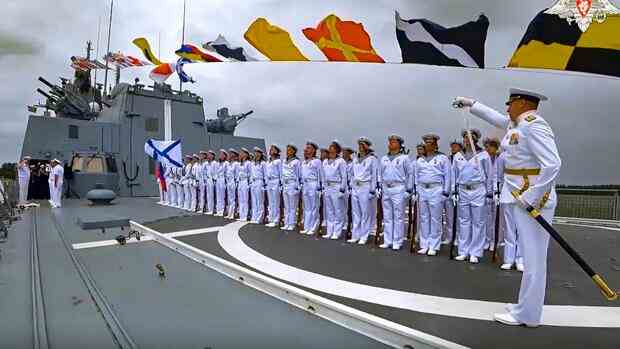Cape Town Hardly anyone in Europe will understand the view of Russia in parts of Africa: while Vladimir Putin is the clear enemy in the West, the Russian head of state and his country are still arousing positive feelings in many places in southern Africa, especially in government and military circles.
Many of the region’s policy makers studied in the Soviet Union during the Cold War. They also remember gratefully the lavish military aid that Moscow then gave to many resistance movements in Angola, Mozambique and South Africa, and are all still in office today, like the African National Congress (ANC) in South Africa.
It’s no wonder that Russia’s Foreign Minister Sergey Lavrov was given an extremely friendly welcome, especially in South Africa, on his recent trip to Africa. “I’m proud that we maintain such excellent diplomatic relations,” said South Africa’s Foreign Minister Naledi Pandor, who had sharply criticized the Russian invasion of Ukraine a year ago and called for a Russian withdrawal.
Shortly thereafter she had to backtrack because her criticism was not in the interests of the ANC and its President Cyril Ramaphosa. Instead, he advocates “neutrality”.
Apparently, South Africa’s self-defined neutrality also includes a joint military exercise that the country has been undertaking off its east coast together with Russia and China since last weekend and that will continue on the anniversary of the Russian invasion of Ukraine. Foreign Minister Pandor called the fleet maneuver “completely normal”. Especially since Russia is a country with which good relations are maintained, as she says.
China sends three warships
One of the most modern Russian warships, the frigate “Admiral Gorshkov”, is taking part in the maneuver itself. It can be armed with modern Zircon hypersonic missiles, which Russia successfully tested for the first time in 2022. These missiles fly at up to eight times the speed of sound and are therefore almost impossible for missile defense systems to reach. The Zirkon missiles should not be used in this maneuver, it said.
Russia, China and South Africa have been holding naval maneuvers off the east coast of South Africa for a week.
(Photo: Reuters)
In addition, China has sent three ships, including the modern destroyer Huainan. Although South Africa itself is involved with around 350 members of the Navy, it apparently only sends the 50-year-old SAS Protea and a small patrol boat into the field. The symbolic character seems to be more important here than the development of operational knowledge and skills, which the maneuver officially serves.
The main reason why South Africa is not getting involved with more ships is that its military practically no longer exists, as journalist Tim Cohen writes in the “Daily Maverick”. The once prosperous local arms industry either went bankrupt or was sold under ex-President Jacob Zuma, he notes.
South Africa is only taking part in the maneuver with an old warship and supply boats.
(Photo: AP)
Greg Mills and Ray Hartley from the Brenthurst Foundation think tank suspect that the cooperation, which at first glance appears to be of little benefit to South Africa, has motives other than purely nostalgic. “Russia Today”, the Kremlin’s mouthpiece, intends to open its first large English-speaking office on the continent in the business metropolis of Johannesburg. In addition, Russia may be hoping to revive a deal to build Russian nuclear power plants that South Africa had rejected for cost reasons.
Moscow wants to expand influence in South Africa
The Russians themselves seem to be primarily interested in expanding their influence in the continent’s only industrialized country. So far, Moscow has forged alliances there with regimes such as those in Burkina Faso, Mali and the Central African Republic, whose leaders are seeking Russian military assistance out of fear of falling.
Mills and Hartley fear that this influence could now be deepened in the Cape through a Russian specialty: election rigging.
South Africa will re-elect in 2024. There are many indications that the ANC could then fall below the 50 percent mark for the first time in 30 years and have to form a coalition with another party. The two analysts fear that the ruling party could take Putin’s autocratic style as a model. “For a hard-pressed ANC struggling with dwindling support, the Putin model is quite attractive,” they write. After all, he sits at the head of a state with a small elite without being threatened with losing power through an election, regardless of how much he abuses it.
In South Africa’s civil society, the government’s alliance with Russia is by no means unanimous: according to surveys, three-quarters of those polled recently spoke out against Russia’s actions in Ukraine.
The endowment of Nobel Peace Prize laureate Desmond Tutu, who died in 2021, became even more explicit. By participating in the maneuvers, South Africa joined the war on Russia’s side. The country risks ruining its hard-earned post-apartheid reputation as a moral bastion of human rights.
More: How Russia Diverts Its Trade Flows and Outsmarts the West
